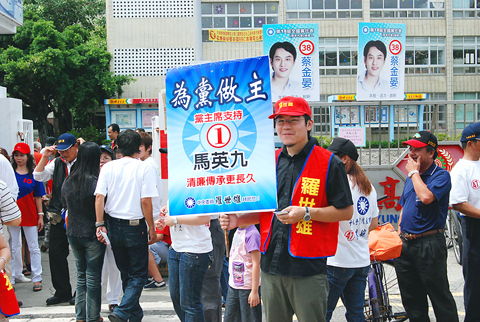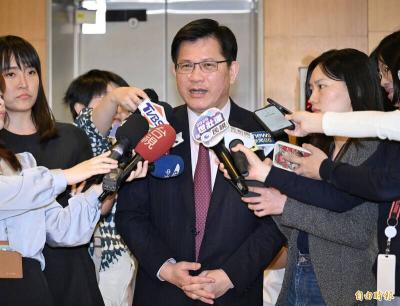A series of challenges awaits President Ma Ying-jeou (馬英九) as he prepares to take over the party chairmanship, analysts said yesterday.
Ma was elected KMT chairman in yesterday’s party election in which he was the sole candidate for the top post. He will take over the job on Sept. 12 during the party congress.
Ma, who had said he would not take over the KMT chairmanship during last year’s presidential campaign, changed his mind after assuming office and announced his candidacy last month in a bid to tighten his control over the legislature, the party and cross-strait affairs.

PHOTO: HOU CHENG-HSU, TAIPEI TIMES
Shih Cheng-feng (施正鋒), a political commentator at National Dong Hwa University, said Ma’s decision to double as party chairman was not surprising and that the KMT’s functions will be weakened under Ma’s leadership regardless of his support in yesterday’s election.
“Ma takes over the chairmanship in order to hold the KMT’s power in check and centralize his power, Shih said.
While Ma repeatedly he was not seeking the chairmanship to expand his power but to take more responsibility, Shih said it was clear that Ma wanted the job to push through his policies more effectively and to eliminate negative factors on his way to a second term as president.
As KMT chairman, Ma will have more control on the nomination of party candidates, especially after the redrawing of administrative zones following the mergers or upgrade of counties and cities.
However, challenges and opposition from local factions have delayed the KMT’s nomination process for local government head elections and finalizing candidates for the December’s polls will be Ma’s first task as chairman.
In Hualien, for example, five politicians registered for the KMT’s primary for the county commissioner election. However, the party called off the primary last month, reportedly because Ma wanted Minister of Health Yeh Ching-chuan (葉金川) to run in the election.
The KMT has had a hard time finalizing a candidate for the Yunlin County legislative by-election because former legislator Chang Sho-wen’s (張碩文) father, Chang Hui-yuan (張輝元) — who was found guilty of vote-buying in his first trial — insists on running in the election.
Shih said Ma, who has kept his distance from local factions, would have to deal with the local politics if he plans to nominate candidates with integrity as he has promised.
Wang Kun-yi (王崑義), a professor at National Taiwan Ocean University, said Ma’s doubling as KMT chairman will give him absolute power over the party, the legislature, the military and cross-strait affairs.
He said the Ma administration could become authoritarian if the Democratic Progressive Party (DPP) failed to keep the KMT’s performance in check.
“Ma could rule the nation in an open yet authoritarian way. The DPP should prevent that from happening,” he said.
There has been intense speculation that Ma might attend a KMT-Chinese Communist Party (CCP) cross-strait forum in his role as KMT chairman to meet his Chinese counterpart, Hu Jintao (胡錦濤).
Taking control of the KMT’s communication channel with Beijing would help Ma eliminate the influence of old KMT heavyweights such as former KMT chairman Lien Chan (連戰) and outgoing KMT Chairman Wu Poh-hisung (吳伯雄), and claim full authority over cross-strait affairs, Wang said.
Yang Tai-shun (楊泰順), a political science professor at Chinese Culture University, said the main reason Ma wanted the KMT job was to implement his cross-strait policies and control of cross-strait affairs.
Ma could use the KMT’s legislative majority to amend the Constitution, Shih said. He said Ma should ponder the three-way relationship between the Presidential Office, the Executive Yuan and the Legislative Yuan because taking over the chairmanship alone would not solve the power struggle between the three.

Taiwan would welcome the return of Honduras as a diplomatic ally if its next president decides to make such a move, Minister of Foreign Affairs Lin Chia-lung (林佳龍) said yesterday. “Of course, we would welcome Honduras if they want to restore diplomatic ties with Taiwan after their elections,” Lin said at a meeting of the legislature’s Foreign Affairs and National Defense Committee, when asked to comment on statements made by two of the three Honduran presidential candidates during the presidential campaign in the Central American country. Taiwan is paying close attention to the region as a whole in the wake of a

President William Lai (賴清德) has appointed former vice president Chen Chien-jen (陳建仁) to attend the late Pope Francis’ funeral at the Vatican City on Saturday on his behalf, the Ministry of Foreign Affairs said today. The Holy See announced Francis’ funeral would take place on Saturday at 10am in St Peter’s Square. The ministry expressed condolences over Francis’ passing and said that Chen would represent Taiwan at the funeral and offer condolences in person. Taiwan and the Vatican have a long-standing and close diplomatic relationship, the ministry said. Both sides agreed to have Chen represent Taiwan at the funeral, given his Catholic identity and

Chinese Nationalist Party (KMT) Chairman Eric Chu (朱立倫), spokeswoman Yang Chih-yu (楊智伃) and Legislator Hsieh Lung-chieh (謝龍介) would be summoned by police for questioning for leading an illegal assembly on Thursday evening last week, Minister of the Interior Liu Shyh-fang (劉世芳) said today. The three KMT officials led an assembly outside the Taipei City Prosecutors’ Office, a restricted area where public assembly is not allowed, protesting the questioning of several KMT staff and searches of KMT headquarters and offices in a recall petition forgery case. Chu, Yang and Hsieh are all suspected of contravening the Assembly and Parade Act (集會遊行法) by holding

Taiwan would welcome the return of Honduras as a diplomatic ally if the next president of that country decides to make such a move, Minister of Foreign Affairs Lin Chia-lung (林佳龍) said today. “We would welcome Honduras if they want to restore diplomatic ties with Taiwan after their elections,” Lin said during a legislative hearing. At the same time, Taiwan is paying close attention to the Central American region as a whole, in the wake of a visit there earlier this year by US Secretary of State Marco Rubio, Lin said. Rubio visited Panama, El Salvador, Costa Rica and Guatemala, during which he